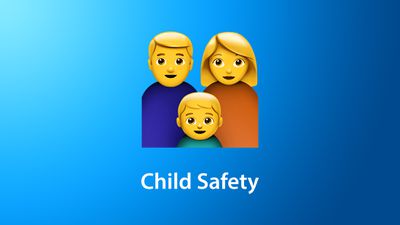Apple's Head of Privacy, Erik Neuenschwander, has responded to some of users' concerns around the company's plans for new child safety features that will scan messages and Photos libraries, in an interview with TechCrunch.

When asked why Apple is only choosing to implement child safety features that scan for Child Sexual Abuse Material (CSAM), Neuenschwander explained that Apple has "now got the technology that can balance strong child safety and user privacy," giving the company "a new ability to identify accounts which are starting collections of known CSAM."
Neuenschwander was asked if, in retrospect, announcing the Communication Safety features in Messages and the CSAM detection system in iCloud Photos together was the right decision, to which he responded:
Well, while they are [two] systems they are also of a piece along with our increased interventions that will be coming in Siri and search. As important as it is to identify collections of known CSAM where they are stored in Apple's iCloud Photos service, it's also important to try to get upstream of that already horrible situation.
When asked if Apple was trying to demonstrate to governments and agencies around the world that it is possible to scan for illicit content while preserving user privacy, Neuenschwander explained:
Now, why to do it is because, as you said, this is something that will provide that detection capability while preserving user privacy. We're motivated by the need to do more for child safety across the digital ecosystem, and all three of our features, I think, take very positive steps in that direction. At the same time we're going to leave privacy undisturbed for everyone not engaged in the illegal activity.
He was asked if Apple had created a framework that could be used for law enforcement to scan for other kinds of content in users' libraries and if it undermines Apple's commitment to end-to-end encryption.
It doesn't change that one iota. The device is still encrypted, we still don't hold the key, and the system is designed to function on on-device data... The alternative of just processing by going through and trying to evaluate users data on a server is actually more amenable to changes [without user knowledge], and less protective of user privacy... It's those sorts of systems that I think are more troubling when it comes to the privacy properties — or how they could be changed without any user insight or knowledge to do things other than what they were designed to do.
Neuenschwander was then asked if Apple could be forced to comply with laws outside the United States that may force it to add things that are not CSAM to the database to check for them on-device, to which he explained that there are a "number of protections built-in" to the service.
The hash list is built into the operating system, we have one global operating system and don't have the ability to target updates to individual users and so hash lists will be shared by all users when the system is enabled. And secondly, the system requires the threshold of images to be exceeded so trying to seek out even a single image from a person's device or set of people's devices won't work because the system simply does not provide any knowledge to Apple for single photos stored in our service. And then, thirdly, the system has built into it a stage of manual review where, if an account is flagged with a collection of illegal CSAM material, an Apple team will review that to make sure that it is a correct match of illegal CSAM material prior to making any referral to any external entity. And so the hypothetical requires jumping over a lot of hoops, including having Apple change its internal process to refer material that is not illegal, like known CSAM and that we don't believe that there's a basis on which people will be able to make that request in the U.S. And the last point that I would just add is that it does still preserve user choice, if a user does not like this kind of functionality, they can choose not to use iCloud Photos and if iCloud Photos is not enabled, no part of the system is functional.
Neuenschwander continued that for users who are "not into this illegal behavior, Apple gain no additional knowledge about any user's cloud library," and "it leaves privacy completely undisturbed."
See TechCrunch's full interview with Neuenschwander for more information.























